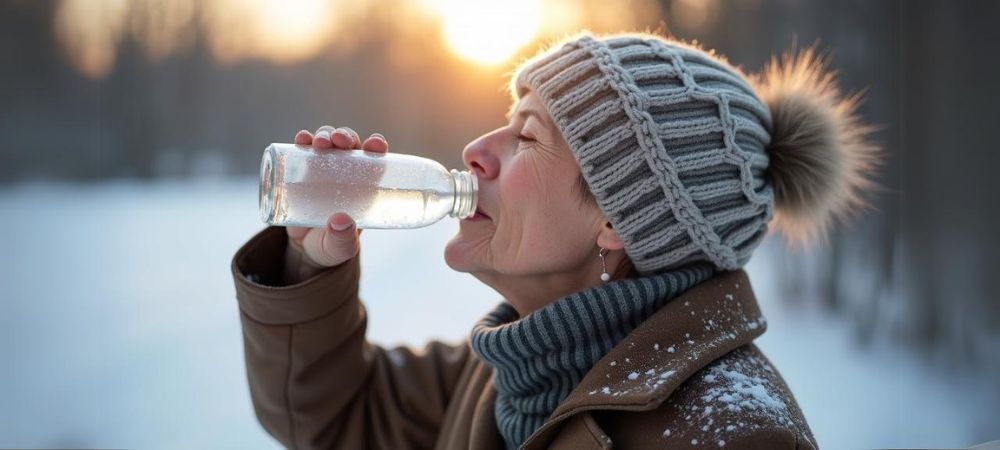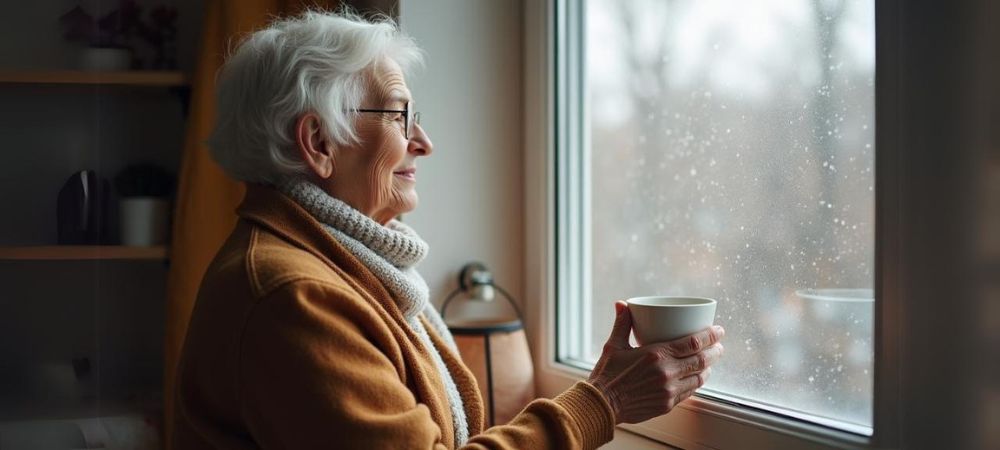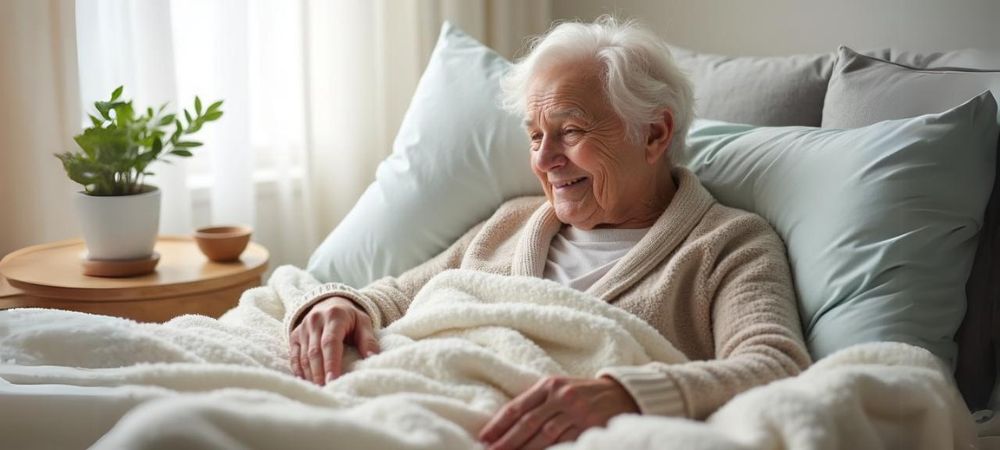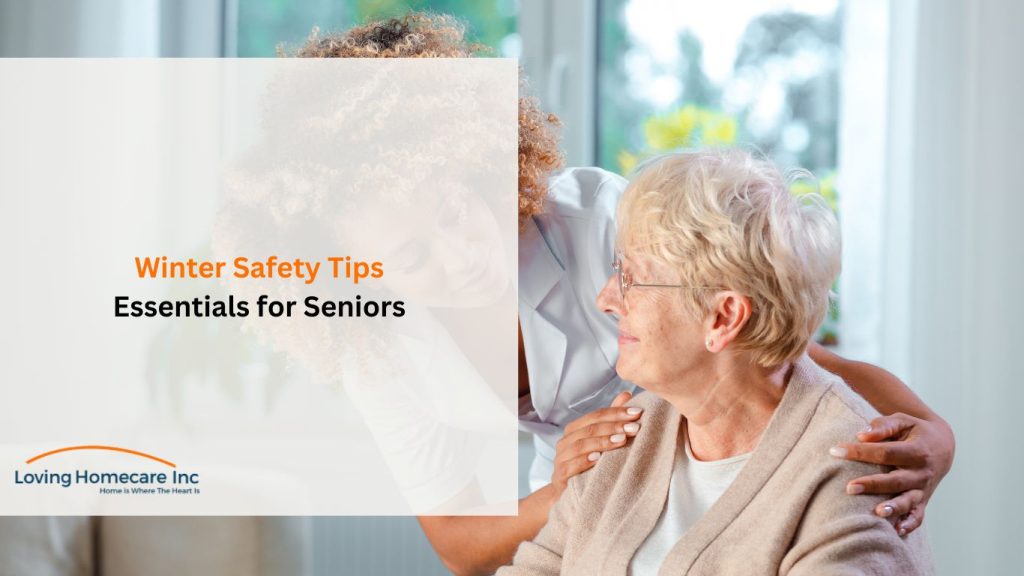Recently updated on October 21st, 2024 at 08:48 am
As the weather changes and turns cold, you might find it magical. However, this change can be dangerous and challenging, especially for older adults, because as we age, our body temperature tends to decrease more quickly. As temperatures drop, older adults are more vulnerable to cold-related health issues. So, it is important to make sure your loved ones stay safe and warm during these colder months.
In this blog, we will cover 11 Winter Safety Tips for Seniors that will keep them healthy and protected throughout the season.
Quick Summary
- With aging, our bodies become less efficient at regulating heat, which makes us feel cold all the time.
- Hypothermia occurs when a body’s temperature falls below 95°F; it can lead to various health conditions, such as damage to the heart and other vital organs.
- Some of the winter safety tips include staying hydrated to prevent dehydration in the winter, protecting skin from winter dryness, maintaining indoor temperature at 68°F to prevent hypothermia, and wearing loose-fitting, lightweight, and warm clothes.
- Seniors can feel isolated during winter; hence, it is important to check on your loved ones frequently, especially those with underlying health conditions.
11 Winter Safety Tips for Seniors
Here are some winter wellness tips for seniors that will help you keep your loved ones safe and protected during this cold season.
Stay Hydrated, Even in the Cold

Hence, the elderly in cold weather should be encouraged to drink plenty of water throughout the day, especially if they are on medication that decreases the build-up of water in their body. Moreover, with the changing weather, illnesses like fever, flu, vomiting, and diarrhea become increasingly common; if your loved one is suffering from any one of these illnesses, they will need even more fluid to recover. It is also important to note that proper hydration helps in maintaining energy levels and supports the immune system.
Moisturize and Protect Senior Skin
Another winter wellness tip for seniors is to keep their skin moisturized and hydrated. The cold air during winter is extremely drying for the elderly’s skin, making it dry, cracked, and prone to infections. This is why it is necessary for seniors to moisturize their skin regularly, especially after bathing, because that is when your skin absorbs a lot of moisture. When selecting a moisturizer for your loved one, be sure to select one that is gentle, fragrance-free, and does not cause allergies. If your skin has become cracked, seniors should contact health care providers immediately to avoid any kind of infection.
Remember that dry skin can be a sign of dehydration; hence, it is important to make sure that your loved one is drinking enough water during winter.
Dress Warmly Indoors and Outdoors
As we age, our bodies lose the ability to regulate heat, which can make staying warm during cold weather challenging. So, how can you keep the elderly warm? In order to keep old people warm, we recommend layering. Seniors should wear warm layers such as thermal shirts, long pants, and wool socks, whether they are staying indoors or outdoors. If your loved ones are heading outside, make sure that they dress in multiple layers, including a hat, scarf, gloves, and a heavy coat.
Wearing the right attire, both indoors and outdoors, can help reduce the risk of the elderly feeling cold all the time and can also prevent more serious conditions like hypothermia.
Keep a Close Eye on Indoor Temperatures

- Keep the thermostat set at 68°F. Even mild changes in temperature, i.e., a temperature between 60-65°F, can lead to hypothermia in old people.
- Use draft stoppers or towels to cover any open areas in the widows, preventing cold air from coming in.
- Wear warm layers.
- Use a throw to keep yourself warm.
- Drink warm drinks such as tea, coffee, or hot chocolate to keep yourself warm.
It is often noted that seniors lower their thermostats to save money, but this can be risky. If heating costs are a concern, programs like the Low-Income Home Energy Assistance Program (LIHEAP) can help pay your heating bills and can be used to get emergency services during an energy crisis.
Use Space Heaters Safely
Another way of staying warm during cold weather is by using space heaters. Space heaters can provide additional warmth, but they should be used cautiously to avoid any kind of health or safety hazard.
- Check the wires of your portable space heaters for fraying.
- Make sure that these heaters have an automatic turn-off feature.
- And remember to keep these heaters away from anything flammable, such as curtains, furniture, carpet, etc.
- Place these heaters carefully; these shouldn’t be placed on uneven surfaces.
- The cord should also be kept out of areas usually used so as to prevent tripping.
Safe use of space heaters can keep old people warm while minimizing any health or safety risks.
Hypothermia & The Elderly
As the bodies of older people cannot retain heat, even mild changes in temperature can lead to hypothermia. Hypothermia is a condition that occurs when the body’s temperature falls below 95°F. This can lead to serious health problems, such as damage to the heart or other organs. Hypothermia can also occur at cool temperatures if your loved one feels cold from rain or cold water.
Hence, it is important for you to keep an eye out for the symptoms of hypothermia. Common symptoms include:
- Cold hands and feet
- Swollen face
- Pale skin
- Shivering
- Slurred speech
- Feeling sleepy, angry, or confused.
So, how can you prevent hypothermia? First and foremost, keep the thermostat at 68°F. If your loved ones are showing signs of hypothermia, we recommend calling for help right away. Try to keep your loved ones warm until help arrives.
Use Electric Blankets with Caution

- Inspect the blanket for any signs of wear and tear. Over time, the wires inside the blanket can wear out, increasing the chances of burns or electric shocks.
- When using an electric blanket, it’s important to inspect it for any signs of damage and replace it if it’s more than a few years old.
- Seniors with poor circulation should be extra careful, as they may not feel the heat as intensely, increasing their risk of burns.
- When shopping for a new electric blanket, choose one with an automatic shut-off feature to further reduce risks.
Footwear Matters: Prevent Slips and Falls
Falls become increasingly common in winter and icy conditions, especially for seniors. Here is how you can stay safe and prevent the risk of injuries from falls.
- Wear sturdy, non-slip footwear whenever you are going outside.
- Shoes or boots with good traction can help prevent dangerous slips on ice and snow.
- Clear sidewalks and driveways or arrange for someone to do it.
- Make sure that the wheels or tips of any walking aid being used are dry before entering the home.
- You can also keep a small table near the entrance to place your things while you unlock the door.
- Use the railings when using the stairs.
- Be sure to keep your outdoor area well-lit.
Slipping and falling are some of the leading causes of injury in the elderly. Hence, it is important to take precautions to prevent the elderly from being at risk of injuries.
Stay Active and Warm Indoors When the Weather is Bad
Seniors should stay indoors, particularly during cold spells, and if they need to run errands, offer to help them or use transportation for seniors to avoid prolonged exposure. Staying indoors does not have to mean being inactive. Seniors can stay active indoors as well by doing light stretching, walking around the house, or even chair exercises. These activities will improve the circulation of blood and overall health.
Staying active will also help maintain their body temperature and reduce the risk of any cold-related health issues.
Plan to Stay Warm During Power Outages
Extreme weather conditions, such as snow storms, are common in winter, which is why you need to have a plan that ensures that your loved ones will stay warm during a power outage. Here is how you can keep them comfortable:
- Use an energy backup to keep your home warm.
- Wear warm clothes. Choose clothes that are loose-fitting and lightweight yet warm.
- Preserve as much heat as possible. Close curtains and windows, close the doors to the rooms that are not used often and place a towel in the cracks and spaces under the doors and windows to prevent cold air from coming in.
- Eat regularly! Food will provide your body with the energy it needs to stay warm and active. Try drinking warm beverages and avoid alcohol.
Frequent Check-Ins and Emotional Support
Winter can be isolating, especially for seniors with limited mobility or who live far from their families. Hence, it is important to check in regularly to make sure they are staying warm and safe. Pay them a short visit, or give them a quick call. Such tiny gestures will prevent them from feeling lonely, keep them engaged, and provide emotional support as well.
Keep them engaged in social activities; if going out is not an option, arrange virtual gatherings for them, which can provide emotional warmth during the colder months.
Over to You
Keeping seniors safe during winter requires attention to both physical and emotional needs. By following these Winter Safety Tips for Seniors, you can help your loved ones stay healthy, warm, and protected throughout the colder months.
Need extra support? Explore the senior homecare services provided by Loving HomeCare. Their loving care home services ensure that your loved ones receive the care and attention they deserve year-round.
Need professional support for your loved ones this winter? Contact Loving Homecare and learn more about their compassionate, personalized senior care options that keep your family safe and comfortable throughout the year.
FAQ's
– Make sure they wear warm, loose-fitting, and lightweight clothing.
– Maintain a home temperature of at least 68°F.
– Avoid going outside during extremely cold days or in extreme weather conditions.

